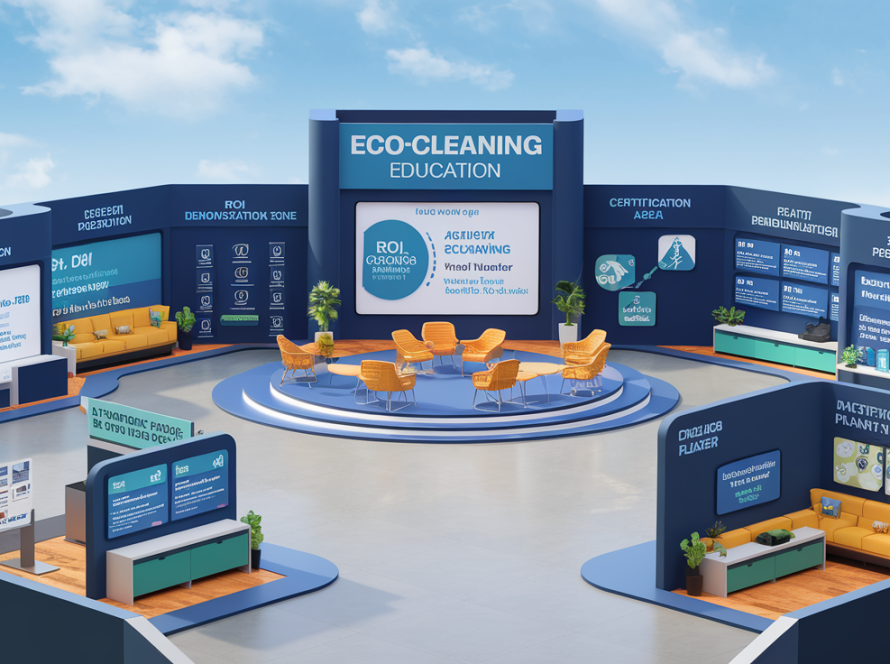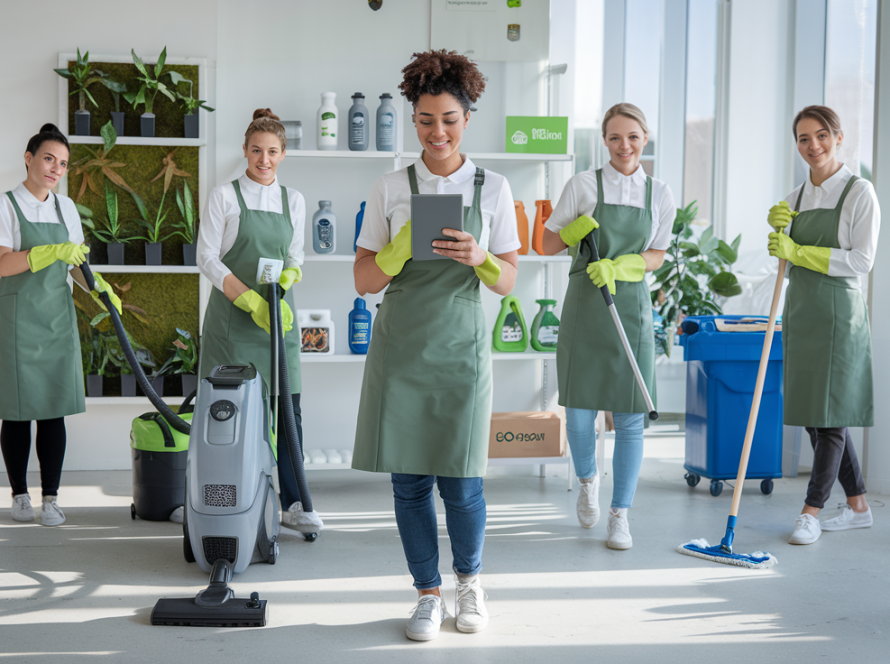Table of Contents
ToggleWhy Eco-Friendly Cleaning Matters
In today’s world, people are becoming increasingly conscious of the impact their choices have on the environment. As concerns about climate change, pollution, and health risks continue to grow, more and more individuals are looking for ways to minimize their ecological footprint. This shift in consumer behavior is driving the demand for eco-friendly products and services, including cleaning solutions that are safe for both humans and the planet. For new cleaning businesses, embracing eco-friendly practices is not only a responsible choice but also a strategic one that can help attract a growing segment of environmentally aware customers.
Eco-friendly cleaning, often referred to as green cleaning, involves using products and methods that are safe for people, animals, and the environment. By choosing sustainable ingredients and avoiding harmful chemicals, cleaning businesses can promote healthier indoor environments, reduce pollution, and contribute to a greener future. This comprehensive guide will help you understand the principles of eco-cleaning, the benefits it offers, and how you can integrate these practices into your new cleaning business to stand out from the competition and thrive in the market.
What is Eco-Friendly Cleaning?
Eco-friendly cleaning, also known as green cleaning, is a holistic approach to maintaining clean spaces while minimizing harm to the environment. It involves the use of cleaning products and methods that prioritize sustainability, health, and safety. Traditional cleaning products often contain harsh chemicals like ammonia, bleach, and synthetic fragrances, which can be harmful to both people and the environment. In contrast, eco-cleaning products are made with natural, biodegradable ingredients that do not pollute the air or water.
The key principles of eco-friendly cleaning include reducing the use of toxic substances, choosing biodegradable and sustainably sourced ingredients, and minimizing waste. This means opting for products that come in recyclable or refillable packaging and using tools that can be reused instead of disposed of after a single use. Eco-cleaning also emphasizes energy-efficient practices, such as using cold water for cleaning whenever possible and reducing the amount of water used.
Some common eco-friendly cleaning ingredients include vinegar, baking soda, lemon juice, and essential oils. These ingredients are not only effective in removing dirt and grime but also safe for people, pets, and the environment. For example, vinegar can be used to disinfect surfaces, while baking soda works well as an abrasive cleaner. Essential oils like tea tree, lavender, and eucalyptus can add a pleasant scent while providing natural antibacterial properties.
The Top Benefits of Eco-Friendly Cleaning
Health Benefits
One of the most significant advantages of eco-friendly cleaning is its positive impact on health. Traditional cleaning products often contain volatile organic compounds (VOCs) that can lead to respiratory problems, skin irritation, and other health issues. Prolonged exposure to these chemicals can be especially harmful to young children, pets, and individuals with allergies or asthma. By using natural, non-toxic cleaning products, you can help create a safer indoor environment for both your clients and your cleaning staff.
Eco-friendly cleaning also reduces the risk of chemical burns, eye irritation, and allergic reactions that are commonly associated with harsh cleaning agents. This not only protects your clients but also ensures the safety and well-being of your employees, reducing the likelihood of workplace accidents and health-related absences.
Environmental Impact
The environmental benefits of eco-friendly cleaning are far-reaching. Many traditional cleaning products contain chemicals that, when washed down the drain, can contaminate water supplies and harm aquatic life. Phosphates, for example, are often found in detergents and can contribute to water pollution, leading to algal blooms that deplete oxygen levels and damage ecosystems. By using biodegradable and phosphate-free cleaning products, you can help prevent such environmental damage and contribute to cleaner waterways.
Eco-friendly cleaning also helps reduce air pollution. Traditional cleaning agents release VOCs into the air, which can contribute to indoor air pollution and smog formation. In contrast, green cleaning products do not emit harmful fumes, resulting in improved air quality both indoors and outdoors. By choosing sustainable cleaning practices, your business can play a role in protecting the planet and reducing the overall carbon footprint.
Business Benefits
Adopting eco-friendly cleaning practices can set your business apart in a competitive market. As more consumers prioritize sustainability, offering green cleaning services can become a powerful differentiator that attracts environmentally conscious clients. Many potential customers are willing to pay a premium for services that align with their values, and positioning your business as eco-friendly can help you tap into this growing market segment.
Moreover, eco-friendly cleaning can enhance your business’s reputation and credibility. Clients are more likely to trust a company that demonstrates a commitment to sustainability and responsible practices. This positive brand image can lead to word-of-mouth referrals, increased customer loyalty, and long-term success. Additionally, by reducing the use of hazardous chemicals, you can lower the risk of regulatory issues and minimize costs associated with handling and disposing of toxic substances.

Understanding the Market Demand for Eco Cleaning
The demand for eco-friendly cleaning services is on the rise as consumers become increasingly aware of the environmental and health impacts of traditional cleaning products. According to recent surveys, a growing number of households and businesses are seeking out green cleaning solutions that align with their values. In fact, the global green cleaning market has experienced significant growth over the past few years, with analysts projecting continued expansion well into the future.
For new cleaning businesses, this trend presents a unique opportunity to capitalize on a changing market. By embracing eco-friendly practices, you can position your business as a leader in the green movement and appeal to environmentally conscious customers. Market research shows that many consumers are willing to pay more for services that contribute to a healthier home and a cleaner planet, particularly millennials and younger generations who are more likely to prioritize sustainability in their purchasing decisions.
Understanding market demand also means recognizing the competitive landscape. Many established cleaning companies are beginning to offer green services, but there is still ample room for new businesses to carve out a niche by being fully committed to eco-friendly cleaning. By focusing on sustainability from the outset, you can create a strong brand identity that differentiates you from competitors who may be making a partial or superficial shift towards green practices.
In addition, the commercial sector is increasingly interested in eco-cleaning. Many businesses are striving to meet corporate sustainability goals and improve their environmental credentials, making them prime candidates for eco-friendly cleaning services. By offering green cleaning solutions, you can position your business to cater to both residential and commercial clients, further expanding your market reach.
Common Eco-Friendly Cleaning Products and Their Uses
Eco-friendly cleaning products are not only better for the environment, but they can also be just as effective—if not more so—than traditional chemical cleaners. In this section, we’ll explore some of the most popular eco-friendly cleaning products and how they can be used effectively.
Natural Ingredients for Green Cleaning
Vinegar: Vinegar is a versatile cleaning agent that can be used for disinfecting surfaces, cutting through grease, and removing mineral deposits. It’s particularly effective in kitchens and bathrooms, where bacteria and buildup are common.
Baking Soda: Baking soda is an excellent natural abrasive that can be used to scrub surfaces, remove stains, and neutralize odors. It’s perfect for cleaning sinks, bathtubs, and even ovens, where tough grime often accumulates.
Lemon Juice: Lemon juice has natural antibacterial and antiseptic properties, making it a great option for cleaning and disinfecting. The acidity of lemon juice also helps to break down grease and stains, while its fresh scent leaves surfaces smelling clean.
Castile Soap: Made from vegetable oils, Castile soap is a gentle yet effective cleaner that can be used on almost any surface, including floors, countertops, and even fabrics. It’s biodegradable and free from synthetic ingredients, making it a popular choice for eco-conscious consumers.
Essential Oils: Essential oils like tea tree, lavender, and eucalyptus are not only great for adding a pleasant scent to your cleaning routine, but they also possess natural antimicrobial properties. A few drops of essential oil can be added to cleaning solutions to boost their disinfecting power.
Commercial Eco-Friendly Products
Biodegradable Multi-Surface Cleaners: Many companies now produce ready-to-use, biodegradable cleaning products that are certified eco-friendly. These products are designed to be as effective as traditional cleaners while being safe for both users and the environment. Look for products that carry certifications like Green Seal or the EPA’s Safer Choice label.
Plant-Based Detergents: Plant-based laundry detergents and dish soaps are a great alternative to conventional products that often contain phosphates and other harmful chemicals. These detergents are tough on dirt and grease but gentle on the environment, and they often come in recyclable or refillable packaging.
Reusable Cleaning Tools: In addition to using eco-friendly cleaning agents, consider incorporating reusable cleaning tools into your business. Microfiber cloths, for instance, are highly effective at picking up dirt and bacteria without the need for chemical cleaners, and they can be washed and reused many times, reducing waste.
Safety Tips for Using Eco-Friendly Alternatives
While natural cleaning ingredients are generally safer than harsh chemicals, it’s still important to use them correctly. For instance, vinegar should not be used on natural stone surfaces like marble or granite, as its acidity can cause damage. Baking soda, while an excellent abrasive, should be used sparingly on delicate surfaces to avoid scratches. Additionally, always label homemade cleaning solutions clearly and store them out of reach of children and pets.
By understanding the uses and limitations of different eco-friendly cleaning products, you can ensure that your cleaning business delivers high-quality results without compromising on safety or sustainability. Incorporating these natural alternatives into your cleaning routines not only helps protect the environment but also provides peace of mind to your clients, who can rest assured that their homes are being cleaned with care.

Setting Up Your Eco-Friendly Cleaning Business
If you’re looking to start an eco-friendly cleaning business, there are several steps you can take to ensure that your operations are truly green. From sourcing the right products to training your team, setting up a sustainable cleaning business requires thoughtful planning and a commitment to your eco-friendly mission.
Sourcing Eco-Friendly Supplies
The first step in setting up an eco-friendly cleaning business is sourcing the right supplies. Look for reputable suppliers that offer certified eco-friendly products, such as those with Green Seal or EPA Safer Choice labels. These products are thoroughly tested for environmental safety and effectiveness, making it easier for you to choose cleaning agents that align with your values. Additionally, consider partnering with local suppliers to reduce the carbon footprint associated with transporting cleaning products.
It’s also important to consider the packaging of the products you use. Whenever possible, opt for products that come in recyclable or reusable containers. Bulk purchasing can also help minimize packaging waste and reduce costs.
Training Your Team
Training your cleaning team on eco-friendly practices is crucial to ensure consistency and quality. Make sure that all team members understand the importance of using green products, and provide them with guidance on how to use these products effectively. Training should also cover proper dilution techniques, efficient cleaning methods that reduce water usage, and safety protocols for handling natural cleaning ingredients.
Additionally, educating your team about the benefits of eco-cleaning can help foster a sense of pride and ownership in their work. When employees understand how their efforts contribute to a healthier environment, they are more likely to be motivated and engaged in their roles.
Cost Considerations
One common concern among new cleaning businesses is the cost of eco-friendly products. While some green cleaning products may have a higher upfront cost compared to conventional alternatives, the long-term benefits often outweigh these initial expenses. By reducing the use of hazardous chemicals, you can lower costs related to handling, storage, and disposal. Additionally, reusable tools like microfiber cloths can help reduce supply costs over time.
To manage costs effectively, consider creating a budget that accounts for eco-friendly supplies, training, and marketing. Keep in mind that many clients are willing to pay a premium for green cleaning services, which can help offset any additional expenses associated with running a sustainable business.
Marketing Your Eco-Friendly Cleaning Services
Marketing is a key component of growing your eco-friendly cleaning business. To attract environmentally conscious customers, it’s essential to highlight your commitment to sustainability and the unique benefits of your green cleaning services.
Positioning Your Business
One of the most effective ways to market your eco-friendly cleaning business is to position it as a company that genuinely cares about health and the environment. Use your website, social media, and marketing materials to communicate your mission and the steps you take to ensure your services are safe and sustainable. Be transparent about the products you use, and educate potential clients on how your services differ from traditional cleaning options.
Highlighting certifications, such as Green Seal or other eco-friendly credentials, can also help build trust with prospective clients. Include customer testimonials that emphasize the health benefits and effectiveness of your cleaning services to further reinforce your brand’s value.
Building an Online Presence
An online presence is crucial for any modern business, especially when it comes to reaching customers who prioritize sustainability. Create a professional website that clearly outlines your eco-friendly cleaning services, pricing, and service areas. Include a blog where you can share helpful cleaning tips, DIY green cleaning recipes, and information about the benefits of eco-friendly practices.
Social media platforms like Instagram, Facebook, and Pinterest are ideal for showcasing your work and engaging with potential customers. Share photos and videos of your team in action, along with before-and-after shots that demonstrate the effectiveness of your cleaning methods. Use relevant hashtags to increase your visibility and reach a broader audience.
Crafting Your Elevator Pitch
A well-crafted elevator pitch can help you quickly convey the value of your eco-friendly cleaning services to potential clients. Keep your pitch short and to the point, focusing on the benefits of eco-cleaning, such as improved health, reduced environmental impact, and a cleaner, fresher home. Practice your pitch until you can deliver it confidently and naturally, whether you’re networking at a community event or speaking with a prospective client.
Overcoming Challenges in Eco Cleaning
As with any business, there are challenges to be faced when adopting eco-friendly cleaning practices. Understanding these challenges and preparing for them will help you run a successful and sustainable cleaning operation.
Addressing Misconceptions
One of the main challenges of eco-friendly cleaning is overcoming misconceptions about its effectiveness. Some potential clients may believe that natural cleaners are not as powerful as their chemical counterparts. To address these concerns, educate your clients about the science behind green cleaning products and provide demonstrations that showcase their effectiveness. Customer testimonials and case studies can also be powerful tools in dispelling these myths.
Sourcing Products and Training Staff
Sourcing high-quality eco-friendly cleaning products can sometimes be challenging, especially in areas where green supplies are not readily available. To overcome this, research suppliers that offer reliable shipping options and consider bulk purchasing to ensure you have a steady supply of the products you need.
Training staff on eco-friendly methods can also present challenges, particularly if team members are used to traditional cleaning techniques. Regular training sessions, detailed guides, and hands-on demonstrations can help your staff become comfortable with green cleaning practices and understand why they are important.
Real-Life Success Stories of Eco Cleaning Businesses
Hearing about the successes of other eco-friendly cleaning businesses can be a great source of inspiration and motivation. Many small cleaning businesses have found great success by embracing sustainability and using it as a central part of their brand.
Case Study: Green Spark Cleaning Co.
Green Spark Cleaning Co. is a small cleaning business that started with a mission to provide eco-friendly cleaning services to local households. By focusing on transparency, Green Spark built a loyal customer base that appreciated the company’s commitment to using only natural, safe products. Through word-of-mouth referrals and an active social media presence, the business grew rapidly, eventually expanding into commercial cleaning services for local businesses looking to improve their sustainability credentials.
Lessons Learned
From these success stories, it’s clear that transparency, consistency, and customer education are key factors in building a successful eco-friendly cleaning business. By making sustainability a core value and effectively communicating that value to customers, you can create a unique brand that resonates with today’s environmentally conscious consumers.
The Future of Cleaning is Green
Eco-friendly cleaning is not just a passing trend—it is the future of the cleaning industry. As more consumers recognize the importance of sustainability, the demand for green cleaning services will continue to grow. By adopting eco-friendly practices, you can create a cleaning business that not only stands out in a competitive market but also contributes positively to the health of your clients and the planet.
Whether you’re just starting out or looking to transition an existing business, embracing eco-cleaning is a powerful way to differentiate your services, attract a loyal customer base, and do your part for the environment. With the right products, training, and marketing, your cleaning business can thrive while making a difference. The future of cleaning is green—let your business be a part of this exciting and essential movement.



